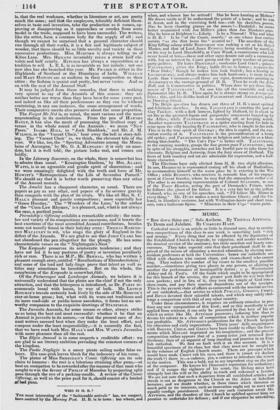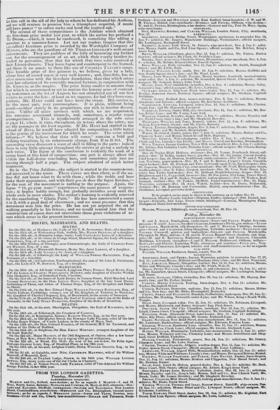. MUSIC.
" Bow down thine ear ,•" Solo Anthem. By THOMAS .ATTWOOD. Te Deum and Jubilate. By CHARLES HART.
Cathedral music is an article so little in demand now, that to receive two compositions of this class in one week is something both " rich and strange." Every thing that can be effected by the dignitaries of the Established Church to degrade, to vulgarize; and render worthless the musical service of the sanctuary, has their sanction and hearty con- currence. They take especial care that their priesthood shall be de- prived of the means of obtaining a musical education, by electing non- resident professors at both the Universities : hence our cathedrals are filled with chanters who cannot chant, and vicars-choral who cannot sing. They reduce the number of lay vicars to the smallest possible number,—sometimes giving two places to one person, or allotting to another the performance of incompatible duties : e. g. Westminster Abbey and St. Paul's. Of the funds which ought to be appropriated for this branch of the service, the greater part finds its way into their own pockets ; and in lieu of it, they turn the temple of .God into a show-room, and pay their musical dependents out of the receipts. This is the present state of affairs as connected with the musical service of our cathedrals,---Ahat service to which PURCELL, GTERONS, • CROFT,. and BOYCE devoted their splendid talents, and which may safely chal- lenge a comparison with that of any other country. Under these circumstances, it requires no ordinary stimulus to pro- duce any new composition of this kind ; and as this manifestly is not applied from without, it can only -be presented by that love of his art which an artist like Mr. ATTWOOD possesses; inducing him thus to devote his talents to a class of composition which is neither popular nor profitable. Mr. ATTWOOD'S productions for the Church bespeak his education and early impressions. Thirty years' daily acquaintance with ROGERS, CHILD, and GREEN have been unable to efface the linea- ments which MOZART imprinted on his imagination ; and the present composition rather appears that of a young artist just returned from Germany, than of an organist of long standing and practice in an Eng- lish cathedral. We find no fault with it on this account. It is a beautiful specimen of its class, but that class must not be soughtfor 'in the volumes of English Church music. There are passages which would have made CROFT rub his eyes, and there is (must we declare the truth ?) there is—a cadence, yea, a cadence to introduce the return to the motivo. This was a bold, not to say imprudent step on the part of the composer. He knows his Diocesan's reputation for orthodoxy; and if it escape the vigilance of his scent, the Bishop must have strangely lost the will or the ability to track and unkennel a heretic. We are not sure that such a departure from all established articles and is not as dangerous to the Church as the Arian or Sabellian heresies; and we doubt whether, in these times which threaten so much peril to its interests,, such an innovation ought not to meet with equally condign punishment. Should- any such visitation await Mr. ATTWOOD, and the thunders of the Church be uplifted against him; we promise to undertake his defence; and if our eloquence be unavailing, let him call in the aid of the lady to whom he has dedicated his Anthem, and we will venture to promise him a triumphant acquittal, if music still have power '° to soften rocks and bend the knotted oak." The second of these compositions is the Jubilate which obtained the Gresham prize medal last year, to which the author has prefixed a Te Deum,-which, it must be confessed, is something like adding a mansion to a summer-house. Let not our readers imagine that this (so called) Gresham prize is awarded by the Worshipful Company of Mercers, who are the guardians of Sir Tnomas GRESHAM'S well-meant endowments. They are guiltless of the folly of bestowing any further .sum for the encouragement of an art which their worthy brother in- tended to patronize, than that for which they have value received at their Livery dinners. They leave fugue and counterpoint to the learned, and there is no music to them like one of CHARLES TAYLOR'S songs. This humble prize of five guineas is, we believe, given by a lady, whose love of sacred music is very well known ; and, therefore, has no other connexion with the Gresham fOundation, than that which arises from her selection of its venerable musical lecturer, in conjunction with Dr. Crtorcit, as the umpire. The prize being smaller in amount than that which is accustomed to set in motion the brawny arms of contend- ing watermen on the 1st of August, has not stimulated any of our first writers to enter the lists : atleast so we suppose, for had they been com- petitors, Mr. HART could not have been the victor. His service is, for the most part, very commonplace. It is plain, without being grand-neither stately in its proportions, nor rich in interior decora- tions. Unlike all other services with which we are acquainted, this contains occasional ritornels, and, sometimes, a regular organ accompaniment. . This is injudiciously arranged in the solo verse at page 11, where it runs, throughout, an octave above the voice; nor arc the passages in the least organic. If Mr. HART had studied in the school of RINK he would have adapted his composition a little better to the genius the instrument for which he wrote. The verse which follows-" We believe that thou wilt come," contains a bold and striking transition, by an enharmonic change, from B to B fiat. The succeeding verse discovers a want of skill in filling in the parts : indeed there is very little attempt throughout the service at giving a melody to each voice. The fugue at the conclusion is evidently the work of a young hand at this kind of composition : one part is always silent till within the half-dozen concluding bars, and sometimes only two are moving through half a page. The subject admitted of much better treatment. So in the Prize Jubilate-the subject is started in the countertenor, and answered in the tenor. These voices are then silent, as if the au- thor did not know what to do with theta; while the treble and bass make their appearance, and with their pas de deux the fugue finishes,- for the rest of the movement is nothing to the purpose. Again, the fugue " 0, go your ways !" experiences the same process of evapora- tion • it begins boldly enough, but gradually dwindles away until the whole ends in mere smoke. The author's learning is evidently reserved for the concluding " Gloria Patri." He has here constructed a canon 4 in 2, with a good deal of cleverness ; and we must presume that this movement won him the prize. He has not yet acquired the art of walking gracefully in his fetters; and we would remind him that the construction of canon does not necessitate those gross violations of ac- cent which occur in the present instance.




























 Previous page
Previous page